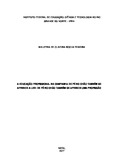A Educação Profissional na campanha de pé no chão também se aprende a ler: de pé no chão também se aprende uma profissão

Visualizar/
Data
2017-03-30Autor
Teixeira, Walkyria de Oliveira Rocha
http://lattes.cnpq.br/4579773212923001
Metadado
Mostrar registro completoResumo
This dissertation is a part of the history of vocational Professional Education materialized in the core of the campaign Barefoot, We Also Learn to Read (De Pé No Chão Também Se Aprende a Ler). It aims at promoting the acknowledgment of this important movement of education and culture in the city of Natal/RN in the early 1960s. A public educational policy that fought illiteracy and promoted vocational professional formation. Also, this study contributes for the insertion of this Campaign in the history of vocational Professional Education in Brazil. The investigation path was built on the methodological paradigm using the snowball sampling to meet the privileged subjects. This study is based on interpretative practices founded in documents, bibliographical materials and the speeches of the subjects that objectively compounded the history of the sixth stage of the campaign. They provided the outlining of the social and political conjecture during the term of Djalma Maranhão as mayor of the city of Natal. Thus, through the evidences, was identified the reality surrounding the theme of study in the dialectical movement of history, a dynamic in which the objectification of life was realized. The collected data allowed the mapping of the relationships between education and work experienced during the Campaign, as well as the understanding of Professional Education as the synthesis of these relations within the scope of this municipal policy. In addition, the data showed a range of students from the capital of Potiguar was trained to work professionally, and that the formation process for working was, specially, carried out in the barns of the School Camps built in the surroundings of the city to facilitate the access for those who were politically unprivileged and forgotten by public policies. The approval of vocational professional courses was reflected on the growing demand for qualifications of this nature, registered by the City Hall of Natal at that historical moment, when the population suffered from lack of education and work. The campaign was ceased with the Civil-Military Coup in 1964. It punished the ones responsible for the campaign and tried to banish its traces from history. Nevertheless, this work reunited some of these evidences restoring a substantive part of the vocational professional education of the city.
Keywords: Popular Education; Barefoot, we also learn a profession; lliteracy.



